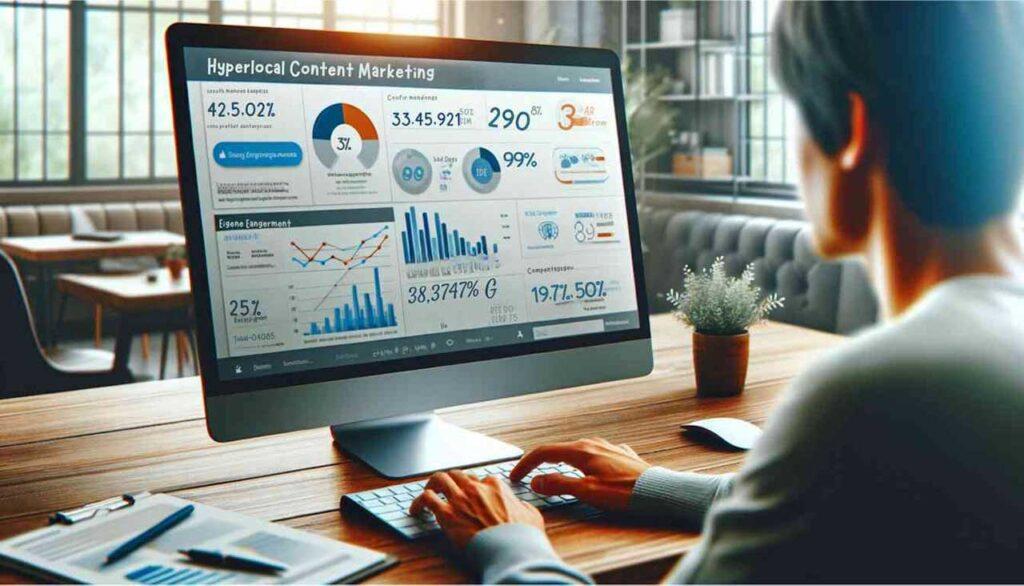Hyperlocal content has emerged as a crucial tool for local businesses looking to engage with their target audience. With the rising popularity of digital media and the increasing use of smartphones, consumers are constantly seeking information that is specific to their immediate surroundings.

This is where hyperlocal content comes into play. By creating content that is tailored to a specific geographic area or community, local businesses can establish themselves as trusted sources of information and build strong connections with their target audience. This, in turn, can lead to increased brand recognition, customer loyalty, and ultimately, improved business performance.
Moreover, hyperlocal content allows businesses to tap into the unique needs and preferences of their local community. By understanding the interests, concerns, and aspirations of their target audience, businesses can craft content that resonates with them on a deeper level.
Whether it’s local events, news, or stories, hyperlocal content enables businesses to provide valuable insights and solutions that are relevant to their consumers’ lives. This not only helps to establish the business as an authoritative voice but also fosters a sense of community and trust. By delivering content that is specific to their locality, businesses can effectively position themselves as a valuable resource for their target audience, resulting in increased brand loyalty and customer engagement.
Identifying the Target Audience and Their Needs in the Local Community
Understanding the target audience and their needs is a crucial step in creating hyperlocal content that resonates with the local community. By identifying who your audience is and what they are looking for, you can tailor your content to meet their specific needs and interests. Start by conducting thorough research and analysis of the local community, studying demographic data, and examining the characteristics and preferences of your potential customers.

One effective way to identify the target audience is by leveraging online tools and platforms that provide detailed insights into the local community. Social media analytics, for example, can help you understand the demographics, interests, and behaviours of the users in your area.
Additionally, you can gather feedback from your existing customers through surveys or online polls to gain further insights into their needs and preferences. By understanding your target audience and their needs, you can create content that not only captures their attention but also provides value and addresses their specific pain points.
Researching Local Keywords and Phrases for Optimal Content Optimisation
One of the key components of creating successful hyperlocal content is conducting thorough research on local keywords and phrases. By understanding the specific terms that resonate with the local audience, businesses can optimise their content to ensure maximum visibility and reach within the community.

To begin the research process, it is important to explore the language and terminology used by residents in the local area. This can be done by engaging with the community through informal conversations, surveys, or by monitoring online discussions and forums.
By gaining insights into the way people communicate and the words they commonly use, businesses can better align their content with the local audience’s language preferences. Moreover, examining trending topics and news stories in the local area can also shed light on the most relevant keywords and phrases that are currently popular among the community.
Creating Engaging and Informative Content that Resonates with the Local Audience
One of the key factors in successful hyperlocal content marketing is creating engaging and informative content that resonates with the local audience. This means understanding the unique needs, interests, and preferences of the local community and tailoring your content to meet these expectations.

To begin, it’s important to conduct thorough research on your target audience. This includes identifying their demographics, interests, and pain points. By understanding their specific needs and challenges, you can create content that addresses these issues and provides valuable solutions.
Additionally, researching local trends, events, and news can help you stay relevant and capture the attention of your audience. Remember, the goal is to create content that not only educates and entertains but also connects with your local audience on a personal level, establishing your brand as a trusted resource in the community.
Using Social Media and Online Platforms to Promote Hyperlocal Content
As hyperlocal content gains traction in the world of marketing, it is crucial for businesses to leverage the power of social media and online platforms to promote their content effectively. With millions of users actively engaging on various social media platforms such as Facebook, Instagram, and Twitter, these platforms provide an excellent opportunity for businesses to reach and connect with their local audience.

By using social media, businesses can create a strong online presence and build brand awareness within the local community. They can engage with their audience by posting relevant and informative content, responding to comments and messages, and actively participating in conversations.
Additionally, businesses can also run targeted ads on social media platforms, ensuring that their hyperlocal content reaches the right audience at the right time. With the potential to go viral, businesses can amplify their message and generate buzz around their products or services, ultimately driving more traffic and potential customers to their business.
Incorporating Local Events, News, and Stories into Content Creation Strategies
Local events, news, and stories provide a valuable opportunity for businesses to connect with their local audience and create meaningful content. Incorporating these elements into content creation strategies allows businesses to tap into the interests and passions of the community, establishing a sense of relevance and authenticity. By aligning with local events, businesses can showcase their involvement in the community and build a positive reputation.

When incorporating local events, news, and stories into content creation, it is important to research and understand the target audience’s interests and preferences. This will enable businesses to create content that resonates with the local community and keeps them engaged.
Whether it’s highlighting upcoming events, sharing news about local achievements, or telling captivating stories of local individuals or businesses, businesses can leverage these elements to connect with their audience on a deeper level. By incorporating local events, news, and stories into content creation strategies, businesses can enhance their brand image, increase their visibility, and foster a stronger bond with the local community.
Building Relationships with Local Influencers and Collaborating on Content
In the digital age, building relationships with local influencers has become an essential aspect of content marketing. These influencers are individuals or organisations that have a significant presence and following within the local community. Collaborating with them not only enhances the credibility and reach of your content but also helps you tap into their loyal audience base.

When it comes to forming these partnerships, it is crucial to approach the influencers with a professional and respectful tone. Start by researching the influencers who align with your brand values and target audience. Once you have identified the right individuals, reach out to them with a personalised message highlighting why you believe a collaboration would be mutually beneficial.
Be clear about your goals and what you can offer in return, such as exposure to your own audience or even financial compensation in some cases. Remember, building relationships with local influencers requires genuine engagement and a commitment to creating meaningful content that resonates with the community.
Leveraging User-Generated Content to Enhance Local Business Marketing
User-generated content (UGC) plays a crucial role in enhancing local business marketing efforts. By encouraging and leveraging UGC, businesses can tap into the power of their existing customer base to generate authentic and engaging content. This can include testimonials, reviews, photos, videos, and social media posts created by customers to showcase their experiences with the brand.

One of the main advantages of UGC is its ability to build trust and credibility in the local community. When potential customers see positive feedback or real-life examples of satisfied customers, they are more likely to trust the business and consider making a purchase.
By incorporating UGC into their marketing strategies, local businesses can showcase their products or services in a genuine and relatable way, helping to establish a strong connection with the target audience. Additionally, UGC can also expand a business’s reach, as customers are more likely to share content and recommend the brand to their friends and family.
Analysing and Measuring the Success of Hyperlocal Content Marketing Efforts
To effectively analyse and measure the success of hyperlocal content marketing efforts, it is essential to establish clear goals and key performance indicators (KPIs). These KPIs will help you determine the effectiveness of your content in reaching and engaging the local audience. Some common KPIs for hyperlocal content marketing include website traffic, engagement metrics (such as likes, comments, and shares), conversion rates, and customer feedback.

One important tool for analysing hyperlocal content marketing efforts is web analytics. By carefully tracking website traffic, you can gain valuable insights into the effectiveness of your content and identify areas for improvement. For example, you may discover that certain types of content or topics generate more traffic or have higher conversion rates. This information can help you refine your content strategy and focus on creating the most impactful and relevant content for the local audience.
In addition to web analytics, it is also important to gather feedback from your target audience. This can be done through surveys, focus groups, or social media listening tools. By actively listening and responding to the feedback of your local audience, you can better understand their needs and preferences, and tailor your content accordingly. This will not only improve the effectiveness of your hyperlocal content marketing efforts but also foster a deeper connection and trust with the local community.
Implementing Local SEO Strategies to Boost Visibility and Drive Local Traffic
Local businesses can greatly benefit from implementing effective SEO strategies to boost their visibility and drive targeted local traffic to their websites. By optimising their website and online content for local search terms and phrases, businesses have a higher chance of appearing in search engine results when potential customers in their area are searching for relevant products or services. This is especially crucial in today’s digital age, where consumers increasingly turn to search engines to find local businesses.

One key aspect of implementing local SEO strategies is conducting thorough keyword research. By identifying the specific keywords and phrases that are commonly used by local customers when searching for products or services, businesses can tailor their website content to include these keywords and improve their chances of ranking higher in search engine results.
This involves including the identified keywords organically throughout the website, including in titles, headings, meta descriptions, and within the main content. Additionally, businesses can leverage the power of local directories and platforms, such as Google Business Profile, to further optimise their visibility in local searches and increase their chances of attracting local customers.
- Conduct thorough keyword research to identify local search terms and phrases
- Tailor website content to include identified keywords organically
- Include keywords in titles, headings, meta descriptions, and main content
- Leverage local directories and platforms like Google Business Profile for increased visibility in local searches
FAQ
What is local SEO?
Local SEO refers to the process of optimising a website or online presence to increase its visibility in local search results. It involves strategies and techniques to help local businesses attract more local customers and drive traffic to their physical locations.
Why is hyperlocal content important for local businesses?
Hyperlocal content is important for local businesses because it helps them connect with their target audience in a specific geographic area. By creating content that is relevant and tailored to the local community, businesses can establish themselves as authorities and attract more local customers.
How can I identify my target audience and their needs in the local community?
To identify your target audience and their needs in the local community, you can conduct market research, analyse customer data, and engage with your local community through surveys or social media. Understanding their preferences, interests, and pain points will help you create content that resonates with them.
How do I research local keywords and phrases for content optimisation?
Researching local keywords and phrases involves using keyword research tools, analysing local search trends, and studying the language and terminology commonly used by your target audience in the local community. This will help you optimise your content to rank higher in local search results.
What are some ways to promote hyperlocal content through social media and online platforms?
To promote hyperlocal content through social media and online platforms, you can share it on your business’s social media accounts, join local community groups or forums, collaborate with local influencers, and engage with local online communities. These strategies can help increase the visibility and reach of your hyperlocal content.
How can I incorporate local events, news, and stories into my content creation strategies?
To incorporate local events, news, and stories into your content creation strategies, you can stay updated on local happenings, involve local businesses or organisations in your content, and share stories or experiences that are relevant to the local community. This will make your content more relatable and engaging for your local audience.
How can I leverage user-generated content to enhance local business marketing?
To leverage user-generated content, you can encourage customers to leave reviews or testimonials, share their experiences on social media using specific hashtags, and feature their content on your website or social media platforms. User-generated content adds authenticity and social proof to your local business marketing efforts.
How can I analyse and measure the success of my hyperlocal content marketing efforts?
To analyse and measure the success of your hyperlocal content marketing efforts, you can use analytics tools to track website traffic, engagement metrics, and conversions. You can also monitor social media metrics, such as likes, shares, and comments, to gauge the impact of your hyperlocal content.
What are some effective local SEO strategies to boost visibility and drive local traffic?
Effective local SEO strategies include optimising your website for local keywords, creating and optimising your Google Business Profile, building local citations, obtaining positive online reviews, and implementing a local link building strategy. These strategies can help improve your visibility in local search results and drive more local traffic to your business.
Conclusion
The strategic implementation of hyperlocal content emerges as a pivotal element for local businesses aiming to fortify their presence and engagement within their specific geographic realms. This approach not only facilitates a deeper connection with the local community by addressing their unique needs and preferences but also significantly enhances brand visibility and loyalty.
By investing in understanding the local audience, conducting comprehensive local keyword research, and creating content that resonates on a personal level, businesses can effectively navigate the digital landscape to their advantage.
Furthermore, leveraging social media platforms, collaborating with local influencers, and utilising user-generated content are innovative strategies that amplify the reach and impact of hyperlocal content. These efforts not only cultivate a sense of community but also bolster the business’s credibility and trustworthiness among the local populace.
Moreover, continuous analysis and adaptation based on the performance metrics of hyperlocal content marketing initiatives are crucial for refining strategies and achieving sustained success. Incorporating local SEO strategies further ensures that businesses remain competitive and visible in an increasingly digitalized world.
As we move forward, the significance of hyperlocal content for local businesses is undeniable. It not only serves as a means to effectively communicate with the target audience but also as a powerful tool to build a strong, loyal customer base grounded in the local community. By prioritising hyperlocal content, local businesses can look forward to not just surviving but thriving in the digital age, making meaningful connections that transcend mere transactions, and fostering a vibrant, engaged community around their brand.
from BE Marketing & SEO Midlands https://barrieevansmarketing.co.uk/hyperlocal-content/

Comments
Post a Comment